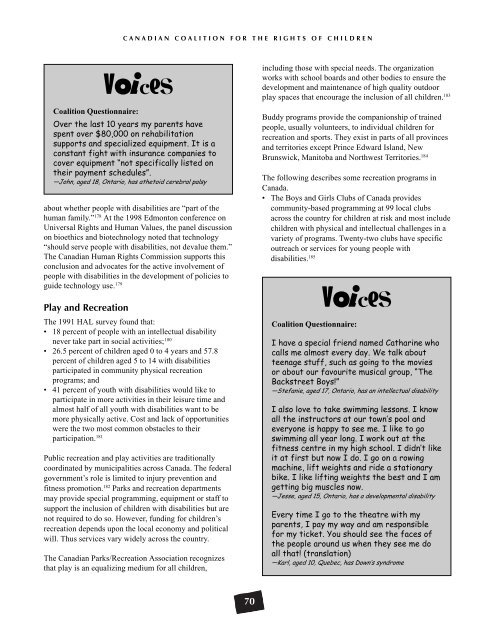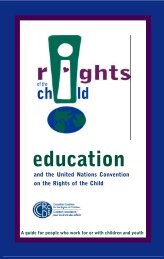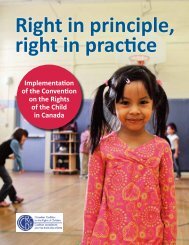Poste - Canadian Coalition for the Rights of Children
Poste - Canadian Coalition for the Rights of Children
Poste - Canadian Coalition for the Rights of Children
You also want an ePaper? Increase the reach of your titles
YUMPU automatically turns print PDFs into web optimized ePapers that Google loves.
C A N A D I A N C O A L I T I O N F O R T H E R I G H T S O F C H I L D R E N<br />
Voices<br />
<strong>Coalition</strong> Questionnaire:<br />
Over <strong>the</strong> last 10 years my parents have<br />
spent over $80,000 on rehabilitation<br />
supports and specialized equipment. It is a<br />
constant fight with insurance companies to<br />
cover equipment “not specifically listed on<br />
<strong>the</strong>ir payment schedules”.<br />
—John, aged 18, Ontario, has a<strong>the</strong>toid cerebral palsy<br />
about whe<strong>the</strong>r people with disabilities are “part <strong>of</strong> <strong>the</strong><br />
human family.” 178 At <strong>the</strong> 1998 Edmonton conference on<br />
Universal <strong>Rights</strong> and Human Values, <strong>the</strong> panel discussion<br />
on bioethics and biotechnology noted that technology<br />
“should serve people with disabilities, not devalue <strong>the</strong>m.”<br />
The <strong>Canadian</strong> Human <strong>Rights</strong> Commission supports this<br />
conclusion and advocates <strong>for</strong> <strong>the</strong> active involvement <strong>of</strong><br />
people with disabilities in <strong>the</strong> development <strong>of</strong> policies to<br />
guide technology use. 179<br />
Play and Recreation<br />
The 1991 HAL survey found that:<br />
• 18 percent <strong>of</strong> people with an intellectual disability<br />
never take part in social activities; 180<br />
• 26.5 percent <strong>of</strong> children aged 0 to 4 years and 57.8<br />
percent <strong>of</strong> children aged 5 to 14 with disabilities<br />
participated in community physical recreation<br />
programs; and<br />
• 41 percent <strong>of</strong> youth with disabilities would like to<br />
participate in more activities in <strong>the</strong>ir leisure time and<br />
almost half <strong>of</strong> all youth with disabilities want to be<br />
more physically active. Cost and lack <strong>of</strong> opportunities<br />
were <strong>the</strong> two most common obstacles to <strong>the</strong>ir<br />
participation. 181<br />
Public recreation and play activities are traditionally<br />
coordinated by municipalities across Canada. The federal<br />
government’s role is limited to injury prevention and<br />
fitness promotion. 182 Parks and recreation departments<br />
may provide special programming, equipment or staff to<br />
support <strong>the</strong> inclusion <strong>of</strong> children with disabilities but are<br />
not required to do so. However, funding <strong>for</strong> children’s<br />
recreation depends upon <strong>the</strong> local economy and political<br />
will. Thus services vary widely across <strong>the</strong> country.<br />
The <strong>Canadian</strong> Parks/Recreation Association recognizes<br />
that play is an equalizing medium <strong>for</strong> all children,<br />
70<br />
including those with special needs. The organization<br />
works with school boards and o<strong>the</strong>r bodies to ensure <strong>the</strong><br />
development and maintenance <strong>of</strong> high quality outdoor<br />
play spaces that encourage <strong>the</strong> inclusion <strong>of</strong> all children. 183<br />
Buddy programs provide <strong>the</strong> companionship <strong>of</strong> trained<br />
people, usually volunteers, to individual children <strong>for</strong><br />
recreation and sports. They exist in parts <strong>of</strong> all provinces<br />
and territories except Prince Edward Island, New<br />
Brunswick, Manitoba and Northwest Territories. 184<br />
The following describes some recreation programs in<br />
Canada.<br />
• The Boys and Girls Clubs <strong>of</strong> Canada provides<br />
community-based programming at 99 local clubs<br />
across <strong>the</strong> country <strong>for</strong> children at risk and most include<br />
children with physical and intellectual challenges in a<br />
variety <strong>of</strong> programs. Twenty-two clubs have specific<br />
outreach or services <strong>for</strong> young people with<br />
disabilities. 185<br />
Voices<br />
<strong>Coalition</strong> Questionnaire:<br />
I have a special friend named Catharine who<br />
calls me almost every day. We talk about<br />
teenage stuff, such as going to <strong>the</strong> movies<br />
or about our favourite musical group, “The<br />
Backstreet Boys!”<br />
—Stefanie, aged 17, Ontario, has an intellectual disability<br />
I also love to take swimming lessons. I know<br />
all <strong>the</strong> instructors at our town’s pool and<br />
everyone is happy to see me. I like to go<br />
swimming all year long. I work out at <strong>the</strong><br />
fitness centre in my high school. I didn’t like<br />
it at first but now I do. I go on a rowing<br />
machine, lift weights and ride a stationary<br />
bike. I like lifting weights <strong>the</strong> best and I am<br />
getting big muscles now.<br />
—Jesse, aged 15, Ontario, has a developmental disability<br />
Every time I go to <strong>the</strong> <strong>the</strong>atre with my<br />
parents, I pay my way and am responsible<br />
<strong>for</strong> my ticket. You should see <strong>the</strong> faces <strong>of</strong><br />
<strong>the</strong> people around us when <strong>the</strong>y see me do<br />
all that! (translation)<br />
—Karl, aged 10, Quebec, has Down’s syndrome




